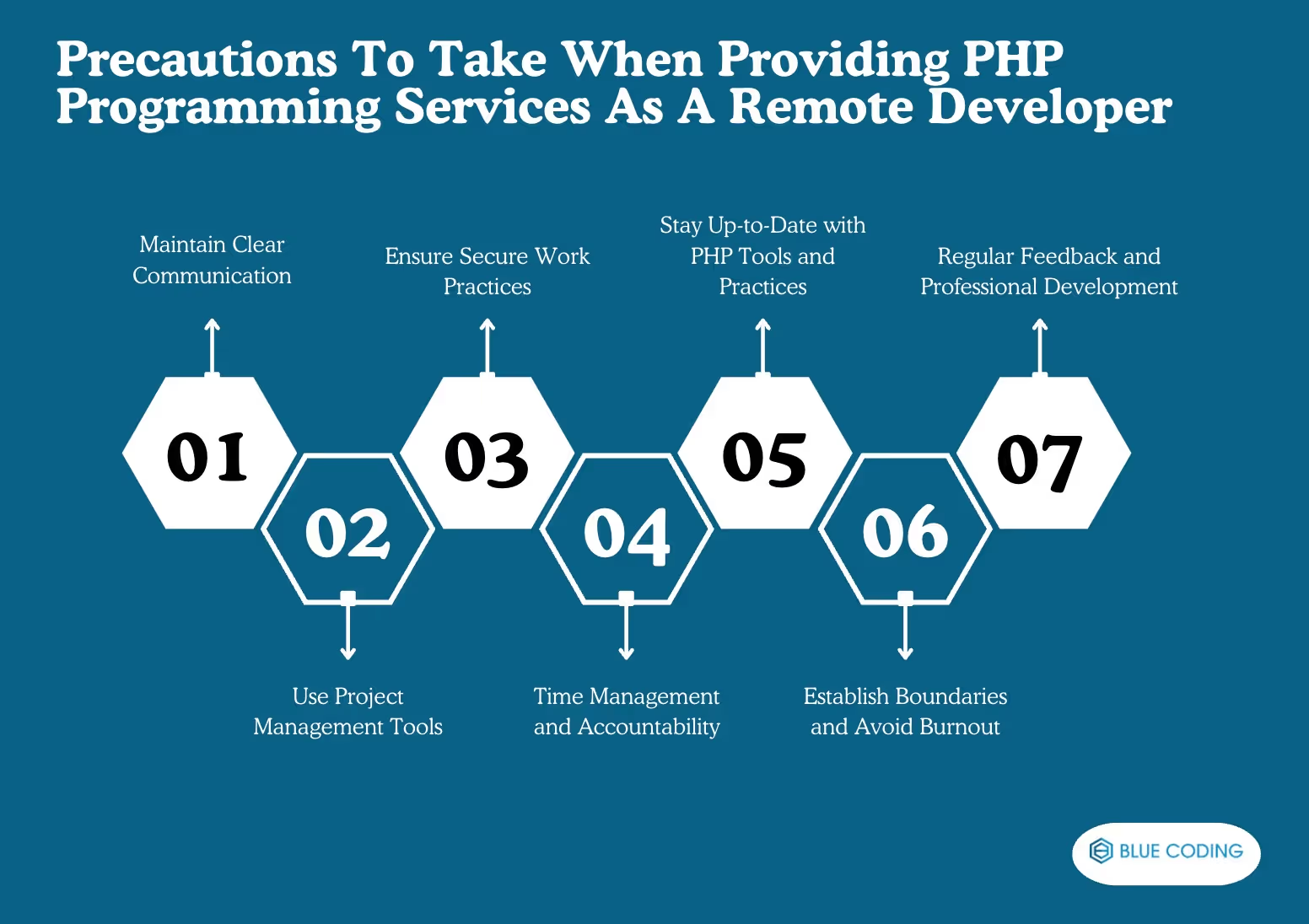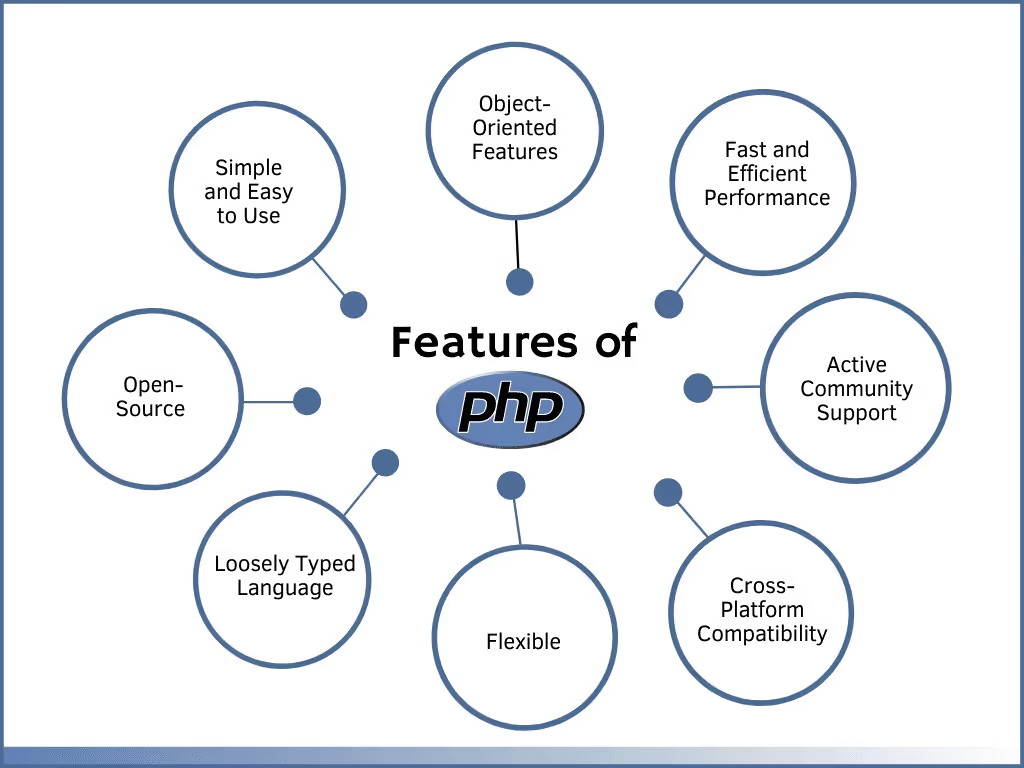Did you know that there are around 20 programming languages existing currently? Each of these languages are unique in its own way and are used specifically for certain types of development projects and tasks. Students who are hoping to establish a career in the software development industry can find it highly challenging to select which skill they want to opt for. In this guide, Blue Coding aims to assist readers and students in understanding the ABCs of PHP development, how to get freelance PHP programming jobs, and how to ace a career as PHP Programmers.

When working remotely as a PHP programmer, there are several precautions to take that help ensure productivity, security, and smooth collaboration. These measures will help maintain your performance and protect sensitive data.
One of the biggest challenges of remote work is communication. To mitigate misunderstandings and ensure smooth collaboration, it’s essential to use perfectly functioning communication tools. These platforms allow teams to share updates, have real-time discussions, and coordinate tasks efficiently. Regular meetings, whether weekly or daily, should be scheduled to discuss project progress, address challenges, and set goals. This also helps you feel connected to the team despite the physical distance.
Remote PHP programmers need strong project management to stay on track with their tasks. Tools like Jira, Trello, or Asana help you prioritize, monitor progress, and manage deadlines. These platforms also provide transparency across the team, enabling everyone to stay informed about the project’s status. Assigning specific tasks and deadlines is crucial for keeping focus on deliverables and for handling large-scale projects.
Security is a major concern when working remotely. As a PHP developer, you are often handling sensitive data and code, so following best practices for cybersecurity is essential. Always use a VPN to encrypt your internet connection, especially when accessing client servers or sensitive databases from public networks. Version control systems like Git or GitHub also play a vital role in safely managing your code and enabling collaboration without compromising security. Keeping your software and devices updated is another crucial measure to prevent vulnerabilities.
Remote work requires discipline to manage time effectively. Without proper time management, it’s easy to blur the lines between personal and professional life. Using time-tracking tools like Toggl or Clockify can help you stay aware of how your time is spent on different tasks. Establishing clear working hours and maintaining a daily routine will ensure you meet deadlines and maintain productivity. Accountability is another factor to consider. You should establish daily goals and stick to a routine. Having clear deliverables for each day or week will keep you motivated. Frequent check-ins with team members or managers can also help hold you accountable for your work.
PHP development changes often, with new methods and updates emerging regularly. It’s important to keep learning and staying up to date with the latest practices. You can do this by reading articles, participating in online discussions, and talking with fellow developers. Learning new ways of coding and staying aware of changes in the PHP world will help you stay skilled and ready for new challenges. This will ensure you’re always delivering high-quality, efficient work.
When working remotely, it can be hard to separate your work from personal time. To avoid feeling overworked, set clear boundaries. Have a specific place where you do your work to mentally separate it from your home life. Also, take breaks throughout the day to relax and stay energized. By managing your time wisely and not overworking, you’ll stay productive without getting exhausted.
Improvement is important, especially when providing PHP programming services remotely. Ask for feedback from your manager or coworkers regularly. This will help you understand how you can do better and meet expectations. It’s also important to keep improving your skills by learning new things and taking on different projects. This will help you grow in your career and be more successful in the long run.
To become a PHP programmer, you must first master the basics. Start by understanding the key elements of PHP, such as variables, which store data that your code can manipulate, and data types, like strings, integers, and arrays, which define what kind of data can be stored. PHP uses operators (like addition or comparison) to process these data types. Learning how to control the flow of your program is equally important. This involves using control structures like if-else statements to make decisions in your code, and loops (e.g., for and while) to repeat actions.
Next, learn about functions, which allow you to reuse code and make it more organized. They perform specific tasks and can take inputs and return outputs. Arrays are also essential, as they allow you to store multiple values in one variable, making it easier to manage data. Also, error handling and debugging are crucial skills. PHP has built-in functions to help you manage errors and fix problems in your code, which is key for ensuring that your programs run smoothly. Mastering these fundamentals lays the foundation for building dynamic, interactive web applications.

Once you are comfortable with the basics of PHP, it’s important to learn how to use PHP frameworks. A framework is a collection of pre-written code that helps developers build applications faster and more efficiently. Some popular PHP frameworks include Laravel, Symfony, and CodeIgniter. These frameworks offer tools and libraries that simplify common tasks like database management, authentication, and routing (managing different web pages or functions).
Using a framework helps you write cleaner, more organized code. It also makes your applications more scalable, meaning they can handle growing amounts of work, and maintainable, so you can easily update or fix issues. Frameworks follow the Model-View-Controller (MVC) architecture, which separates the logic, design, and data layers of your application, making your code easier to manage. Learning a PHP framework will also improve your productivity as a developer and prepare you for working on larger, more complex projects.
One of the most important steps in becoming a successful PHP software development expert is hands-on practice. After learning the basics and exploring frameworks, you should start building real projects. This could be a simple contact form, a personal blog, or a small e-commerce site. Working on these projects helps you apply the knowledge you’ve gained and identify areas where you need improvement.
As you complete projects, it’s essential to create a portfolio. A portfolio showcases your skills and projects to potential employers or clients. It should include descriptions of the projects you’ve worked on, the challenges you faced, and how you solved them. You can also include links to live projects or your code on platforms like GitHub. This will demonstrate your abilities and commitment to learning. Additionally, contributing to open-source projects is a great way to gain experience and collaborate with other developers. A strong portfolio not only highlights your technical skills but also shows your dedication and growth as a PHP programmer.
If you're searching for remote opportunities as a PHP programmer, Blue Coding is the agency for you. We work with global clients and offer you the chance to be part of exciting, diverse projects from the comfort of your home. Our team values flexibility and work-life balance, ensuring you have the freedom to manage your time effectively while working on fantastic projects. By joining Blue Coding, you’ll have access to a wide range of career growth opportunities, professional development support, and a welcoming community of like-minded developers. Check out our job portal and apply to the most relevant opportunity!
Subscribe to our blog and get the latest articles, insights, and industry updates delivered straight to your inbox